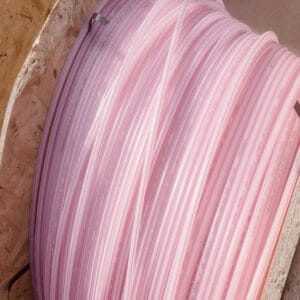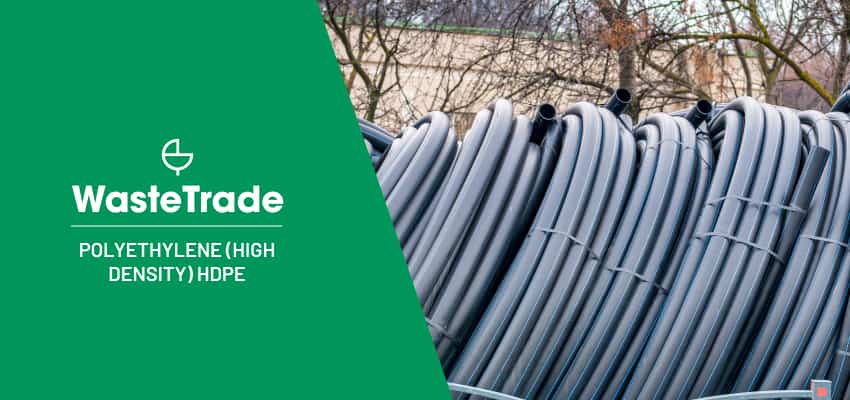WasteTrade Materials
HDPE Recycling
Buy & Sell HDPE plastic worldwide at WasteTrade. We specialise in HDPE Recycling in the UK, where you get the best prices for your HDPE plastic scrap materials
Materials
HDPE Recycling
HDPE recycling in the most sustainable way is now easier and more profitable than ever before thanks to the WasteTrade marketplace. We offer you, and the materials you have to sell, exposure to the global waste industry’s most reputable recyclers, all of whom are fully vetted before being granted access to marketplace. The plastics you are looking to move onto HDPE recycling services will be available to far more potential buyers than could ever be achievable when using traditional brokerage firms.
As well as making the process of HDPE recycling quick and effortless, WasteTrade also gives you the power to decide on the best offer for yourself. You need no longer worry if the prices your broker is showing you are representative of your materials’ true value, as the price WasteTrade shows you is the price they buyer is offering. Neither do you have to worry about whether your broker’s end user is ethical, as all buyers on our platform have been through our verification process.
WasteTrade does not take commissions or charge fees on materials sold to HDPE recycling services through the platform, so you keep all the money they sell for and don’t have to split it with a middleman. Creating your WasteTrade account is completely free, and once we have completed our fast verification process, you will be granted full access to the marketplace and can begin selling your materials.

HDPE Recycle
There are many reasons for a business to choose an HDPE recycle service to dispose of their waste, as opposed to disposing of it by incineration or landfill. The environmental benefits of this alone are numerous, such as reducing carbon emissions, minimising waste, preventing pollution and moving towards a circular economic business mode. As well as all of these, recyclers will actually pay businesses for their waste materials, unlike landfill and incineration sites who charge fees.
Despite the financial and environmental incentives there for businesses to use an HDPE recycle service for their scrap materials, many of them still currently choose to pay for landfill or incineration. This is sometimes due to a simple lack of knowledge about their options for recycling, but more often it is due to the excessive amounts of red tape involved. There are many compliance and logistical issues that arise when sending plastic waste for recycling, and many businesses would rather pay for the convenience of incineration or landfill than deal with them all.
However, with the entrance of WasteTrade into the industry, these issues no longer need prevent anyone from benefitting from HDPE recycle solutions for their plastic scrap. WasteTrade handles all logistics and compliance on behalf of the buyer and seller to remove these obstacles from the recycling process.

HDPE Plastic Recycling
The exact process of HDPE plastic recycling can vary, but the general stages involved remain the same in whichever method is being employed. The first step in HDPE plastic recycling is to separate out all non-HDPE substances from the HDPE, to ensure there are no contaminants present that would compromise the quality of the finished recycled product.
The next step in the HDPE plastic recycling process is to separate the HDPE materials into grades, as HDPE can vary in durability and thickness. Once separated, the HDPE will be thoroughly cleaned to remove any residual contaminants, such as dirt or liquid. Once cleaned, the HDPE will be homogenised to guarantee that no other polymers are present.
The final step in the HDPE plastic recycling process is to then shred the HDPE, melt it down, and then shape and cool it into recycled plastic pellet ready to go back into manufacturing.

Recycle HDPE
Through WasteTrade, it has never been as easy or as rewarding for businesses to choose to recycle HDPE, rather than sending it to landfill or incineration. Our platform safely opens you up to our fully-vetted global userbase, so all you need do is create your listings and wait for the right offer to come in. Once you accept an offer, WasteTrade handles the entire process from there – just wait for our haulier to arrive, then load the materials.
We remove from you the stress of chasing payments, as our secure transaction service ensures you receive the full amount. The buyer is required to make the payment for your materials to us before we release a vehicle to your site, then we release the payment to you as soon as the haulier has collected your materials. It does not need to be a laborious or time-consuming task to recycle HDPE anymore, thanks to the arrival of the WasteTrade global marketplace in the industry.

GET THE BEST PRICE FOR YOUR BULK PLASTIC - 3 TONNES+
Sell Your Plastic Material
WasteTrade makes it easier than ever to sell waste commodities for the best prices to the most sustainable reprocessors.
Frequently asked questions
High-Density Polyethylene, or HDPE, is a thermoplastic made from the monomer ethylene. Ethylene is polymerised to create Polyethylene; HDPE is one of the five categories the different types of Polyethylene can be grouped into.
High-Density Polyethylene (HDPE) is strong, lightweight, weather resistant, impact resistant and malleable, meaning it is highly versatile. HDPE has a wide range of applications, such as: Piping, automotive parts, toys, flower pots, storage bins, recycling bins, crates, rope, gardening tools, garden furniture, cereal box liners, milk bottles and more.
High-Density Polyethylene (HDPE) is a very safe plastic. HDPE is frequently used to make food containers as the material is completely food-safe; another safety feature of this plastic is that it is shatter resistant. Also, given that HDPE is widely recyclable, it is one of the most environmentally friendly polymers - provided it is disposed of properly.
High-Density Polyethylene (HDPE) is a highly versatile material that is a popular choice for construction applications. This is because the material is waterproof, weather resistant, impact resistant and UV resistant. The properties of High-Density Polyethylene mean it is frequently used in waterproofing building foundations.
High-Density Polyethylene (High-Density Polyethylene) is an inexpensive material to manufacture; this is especially true due to the fact that the material is widely recyclable, meaning the material can serve many different functions during its lifecycle.